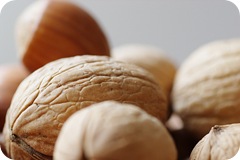Posts Tagged ‘english’
Day 8/30: On nuts and etymologies
 I baked peanut butter cookies today. They are totally awesome. I also started to think about the etymology of the word peanut, which I decided must be completely obvious, since peanuts do resemble peas, sitting snuggly in their cozy, tiny pods. But what about other nuts? Walnuts, for example? There’s nothing special about a walnut that makes it similar to a… what? In Swedish, the word for walnut is valnöt, which might make one think it’s somehow related to val, meaning whale (as well as choice and election, but these are way less spectacular). Of course, I fully realized that such a coincidence is purely coincidental, and that walnuts have nothing to do with whales… But if they do have anything to do with ANYTHING in the first place, what’s that?
I baked peanut butter cookies today. They are totally awesome. I also started to think about the etymology of the word peanut, which I decided must be completely obvious, since peanuts do resemble peas, sitting snuggly in their cozy, tiny pods. But what about other nuts? Walnuts, for example? There’s nothing special about a walnut that makes it similar to a… what? In Swedish, the word for walnut is valnöt, which might make one think it’s somehow related to val, meaning whale (as well as choice and election, but these are way less spectacular). Of course, I fully realized that such a coincidence is purely coincidental, and that walnuts have nothing to do with whales… But if they do have anything to do with ANYTHING in the first place, what’s that?
So, I took the cookies out of the oven and logged in to the good old Oxford English Dictionary, ready to research the origins of some interesting nut-words. I started, obviously, with nut, just to make sure where it comes from:
- Nut is an old Anglo-Saxon word. There’s no information on HOW old it is exactly, but it was known as hnutu in Old English. It most probably comes from the Proto-Germanic *khnut and the Proto-Indo-European *knu (the asterisk denotes a word that has been reconstructed on the basis of our knowledge of language development, but that has no actual evidence behind its existence).
- Walnut is, essentially, foreign nut. The wal- part comes from the Old English wealh, meaning foreign, which is also related to today’s Welsh. Just as the Welsh were foreigners to 11th-century Englishmen (the first recording of walnut comes from ca. 1050), the walnut, originating from Italy, had to be differentiated from the good old hazelnut. The OED makes an interesting remark on the origin of walnut:
The solitary OE. example (in a glossary c1050) is the earliest known appearance of the word in any language. The word must, however, have come to England from the Continent, but there is no evidence to show whether it belonged to the primitive OE. vocabulary, or was introduced at a relatively late date.
- Hazelnut seems to be a much older word; the first known recording is dated 725. Hazel was hæsel in Old English and comes most probably from the Proto-Germanic *khasalaz.
On a side note, the first to use hazel in the meaning "the color of hazelnuts, pertaining to eyes" was William Shakespeare:
Thou wilt quarrell with a man for cracking Nuts, hauing no other reason, but because thou hast hasell eyes.
Romeo & Juliet III. i. 22
- Peanut, finally, has exactly the etymology you’d expect it to – it’s a nut that resembles a pea. There’s something interesting about its usage, though. The first recorded instance of peanut, from 1794, refers not to what we today know as the peanut, (Arachis hypogaea) but to the nut of a completely different plant (Castanea pumila). This meaning is, of course, not used today anymore. The first to use the word in today’s meaning was Washington Irving, who in 1802 wrote:
I amused myself with eating pea-nuts.
- Good for him :)